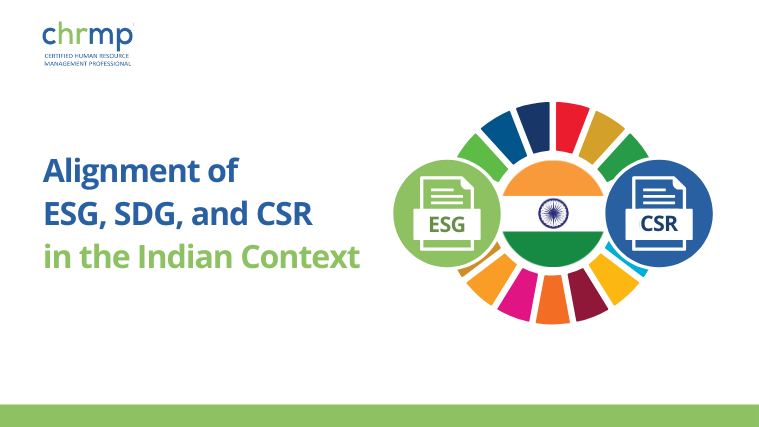

In recent years, the concepts of Environmental, Social, and Governance (ESG) criteria, Sustainable Development Goals (SDGs), and Corporate Social Responsibility (CSR) have gained significant traction in the global business landscape. These frameworks represent various approaches to sustainable development and responsible business practices. In the Indian context, the alignment of ESG, SDG, and CSR is not just a strategic necessity but also a reflection of the country’s commitment to inclusive growth and sustainable development. This article explores the intersection and alignment of these frameworks within the Indian business environment.
ESG refers to the three central factors in measuring the sustainability and societal impact of an investment in a company or business. These criteria help to better determine the future financial performance of companies (return and risk).
SDG stands for Sustainable Development Goals, a collection of 17 global goals set by the United Nations General Assembly in 2015 for the year 2030. These goals aim to end poverty, protect the planet, and ensure prosperity for all.
CSR is Corporate Social Responsibility, a self-regulating business model that helps a company be socially accountable to itself, its stakeholders, and the public. By practising CSR, companies can be conscious of the kind of impact they are having on all aspects of society including economic, social, and environmental.
India has a unique regulatory environment that mandates corporate responsibility. The Companies Act, 2013, specifically Section 135, mandates that companies meeting certain thresholds of turnover, net worth, or profit, must spend at least 2% of their average net profit of the last three years on CSR activities. This legislation underscores the importance of integrating social and environmental concerns into business operations.
Furthermore, the Securities and Exchange Board of India (SEBI) has made it mandatory for the top 1,000 listed companies by market capitalization to include Business Responsibility and Sustainability Reporting (BRSR) as part of their annual reports. This aligns with global trends towards increased transparency and accountability in business practices, driving the adoption of ESG principles.
India faces significant environmental challenges, including air pollution, water scarcity, and climate change. Companies are increasingly recognizing the importance of environmental sustainability, driven by regulatory requirements and stakeholder expectations.
Social issues such as poverty, education, healthcare, and gender equality are critical in India. Businesses are leveraging CSR and ESG strategies to address these challenges.
Strong governance practices are crucial for maintaining investor confidence and ensuring long-term sustainability.
While there is a growing alignment of ESG, SDG, and CSR in India, several challenges remain:
Despite these challenges, there are significant opportunities for businesses in India to lead in sustainable development:
The alignment of ESG, SDG, and CSR in the Indian context is not just a regulatory requirement but a strategic imperative for sustainable growth. By integrating these frameworks, Indian businesses can address critical environmental and social challenges, contribute to national and global development goals, and create long-term value for all stakeholders. As awareness and understanding of these frameworks grow, and as more companies embrace these principles, India can pave the way for a more sustainable and inclusive future.

© 2007-2025 CHRMP| All Rights Reserved | Powered by Ripples Learning & Research Private Limited
